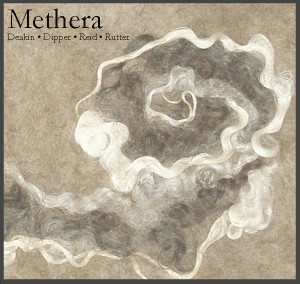 The intersections between high art and the vernacular, at this point in history, come in almost too many varieties to enumerate. Aside from the so-called “classical” composers who have used folk and vernacular material in their compositions (all of whom in the last century or so have been romantics or modernists, as it happens, ranging from Gustave Mahler to Maurice Ravel to Benjamin Britten, Lou Harrison and Terry Riley), such groups as the Kronos Quartet have made vernacular music an integral part of their repertoire, while composers such as Eric Whitacre and Richard Einhorn have incorporated influences ranging from plainsong to rock to marching bands. One of the latest manifestations of this urge is the string quartet Methera, who have now released their first, eponymous collection on their own, eponymous label.
The intersections between high art and the vernacular, at this point in history, come in almost too many varieties to enumerate. Aside from the so-called “classical” composers who have used folk and vernacular material in their compositions (all of whom in the last century or so have been romantics or modernists, as it happens, ranging from Gustave Mahler to Maurice Ravel to Benjamin Britten, Lou Harrison and Terry Riley), such groups as the Kronos Quartet have made vernacular music an integral part of their repertoire, while composers such as Eric Whitacre and Richard Einhorn have incorporated influences ranging from plainsong to rock to marching bands. One of the latest manifestations of this urge is the string quartet Methera, who have now released their first, eponymous collection on their own, eponymous label.
The aim, they say, is to bring traditional songs, or songs in traditional styles, into “the cohesive structure of the string quartet.” I’m not sure how much weight to lend that statement: as an ensemble, there is little in the way of an instrinsic structure in a string quartet; that, I think, is more to be found in the music traditionally created for that particular vehicle. There is, indeed, a certain purity inherent in that grouping (which I suspect is a motivation for my own fondness for chamber music): a leanness, a clarity, a necessity to reduce the music to its essentials, because, after all, you only have four performers. The question here is whether those qualities are any different in this case than they would be if these tunes were performed by a “traditional” ensemble, which is, when all is said and done, pretty minimal to begin with: after all, fiddling is fiddling, and it’s either good or not so good.
And as always, we get to the essential question: what about the music itself? These four musicians (Emma Reid and John Dipper, violins — interestingly enough, noted on their Web site as “fiddles”; Miranda Rutter, viola; Lucy Deakin, cello) are certainly no slouches: the traditional tunes, as arranged by them, and the “composed” works that they have created, provide a seamless blend throughout this collection. Assume that the musicianship is of a high order: it is. (It would be interested to see what this group can do with a wider repertoire — perhaps a sort of “Kronos Quartet: The Next Generation”?) I have no arguments with the technical aspects of this production at all.
What is also evident is intelligence and respect for the material: we are not dealing with wild-eyed revolutionaries here. My only complaint is that sometimes this respect moves over into reverence that doesn’t always provide the edge that I think is implicit in some of these tunes: the jigs could be jiggier, if you know what I mean. It’s not a general complaint, just something that I noticed a time or two, but I did notice. Of more import, I think, is that despite the range of the material, which includes English, French and Swedish tunes as well as those composed by the quartet members (some of which have a distinctly Irish cast to them), the reach seems to be toward an overall “traditional” feel rather than any highlighting of the differences in origins. I can’t claim to be an authority on traditional music, but I do claim some ability to listen to a tune and at least be able to figure out where it came from, most times. Not here. This may simply be an artifact of passing these traditions through the lens of this particular group and its own aesthetic judgments — that I can’t tell. What it does mean is that there’s not a lot of variety in this collection.
My final thought is that it’s an appealing collection, although not particularly revolutionary in any sense, performed with a great deal of skill and sensitivity. I don’t think I’d storm the doors of my local music store to have it, but neither would I turn it down if it were offered.
(Methera, 2008)
